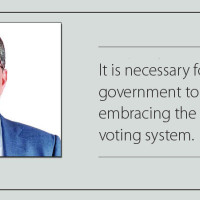- Wednesday, 11 February 2026
Check Conflict Of Interest In Public Sector
Conflicts of interest (CoIs) have always been part of human beings’ daily life and a permanent concern in legal affairs. CoI is a situation where individuals must choose between their professional duties and their own private interests. Therefore, individuals in authority very frequently have potential CoI within their organisations. CoIs take place when a person in a position derives personal benefit from actions or decisions made in their official capacity. If a person or institution has a relationship, personal or otherwise, which has the potential to compromise or interfere in professional objectivity or judgment in issues related to the relationship.
Most of the government organisations take conflicts of interest so seriously that they are regulated and controlled. Conflicts of interest can occur when an individual makes or influences a decision and does so for some personal gain that may be unfair, unethical, or even illegal. It can erode public and internal trust, damage organisational credibility, as well as break the law. CoIs could be similarly harmful to trust in public decision making, managers should also consider perception when they decide on specific cases. Conflict of interests involve a breach of trust, of the entrusted responsibility and may take a number of forms. It may be financial or non-financial, direct, or indirect, professional or family-related.
Corruption
Nepal is suffering from political instability. Nobody knows when the transitional stage ends. Multiparty democracy has been unable to move effectively in developing democratic institutions. Such situations have been the source of corruption including conflicts of interest. CoIs encourage corruption by jeopardising government improvement. In Nepal, a conflict of interest involves a conflict between the public duty and the private interest of a public official, in which the official’s private-capacity interest could improperly influence the performance of their official duties and responsibilities.
There are several examples of conflicts of interest including the appointments of businesspersons, financiers, bank owners, school operators, hospital managers, and contractors in key public posts and corresponding changes in policies and contracts that benefit their business, collusion within and between public officials, and service providers or service seekers. One former prime minister when he was in the chair blatantly flew in a private aircraft on a state visit. Immediately the owner of the aircraft was rewarded by a lease of public property for 25 years prior the expiry date of the contract.
Even the Constituency Development Fund has given rise to the cases of CoI as it violated the key democratic principle of separation of power by giving the executive function of budget execution to the legislature. How does the government set up a monitoring mechanism and internal audit of such a loosely managed fund, which is not a part of a structured fund-flow mechanism? Nepal is a democratic country where a single person enjoys the responsibility of three state organs. How should the constitutional provisions of separation of power and check and balance be materialised? Allocations of sufficient national budget have been centered to the constituencies of those in central power. This is the environment created to overlook CoIs deliberately.
So far, Nepal does not have proper or sufficient rules or regulations to control this situation. We do not even have a code of conduct or a culture that determines the case of CoI. If you look back since 1990, there have been various ministerial appointees who have had a conflict of interest. This got worse since the 2006 movement. Daily routines of authorities have been used to involve in the decision resulting in the COIs. Politicians are in the frontline of misuse and to embezzle their authority. Senior bureaucrats and other government officers are highly attracted to join a job offered by big business houses and industrialists after their retirement. In the process of cultivating relationships, they make decisions in favour of these companies and industries when they were in power, pushing Nepal to a state of rampant corruption.
Is it possible to move forward in a country where there is no mechanism to regulate and channel political financing, and there is a lack of political discipline? Is it possible to control and prevent CoIs given the fact that all public officials have private interests of some kind in their capacity as private citizens? Due to Nepal's power-based society and its nepotism and favoritism, various forms of gifts and benefits are common, and it has been the daily routines of the people of power and authority, a surplus of CoIs has been developing. To improve such an ugly scenario, public institutions should establish policies and procedures to identify, monitor, and manage COIs. It is also important to improve budgetary processes, create transparency in government spending, cut bureaucratic red tape, and strengthen performance audits to minimize opportunities for corruption.
Information disclosure
There is a need to study political appointments and procurement decisions from the perspective of conflicts of interest and raise public awareness for effective identification of potential conflict of interest and management. We need to empower ordinary citizens so that they can ask the right questions to the duty-bearers and elected officials demanding transparency and accountability in political appointments, public procurement, and political party financing. We need a cultural change in public conduct where youth can play a change-making role. Further, timely information disclosure and functioning grievance response mechanisms will help address conflict of interest.
Nepal’s development is dependent on good governance at all levels of government. Without political will and commitment, the continuing conflicts of interest will put democratic gains and development at risk. Preventing CoIs is self-discipline. The first step in bringing an end to the conflict of interest starts with you, comply with the code of conduct, obey the policy and procedure about CoIs, and encourage those around you to do the same so that the pathology of COIs is inhibited and the government moves in the direction of improvement.
(Mainali is former secretary of Nepal government.)
















